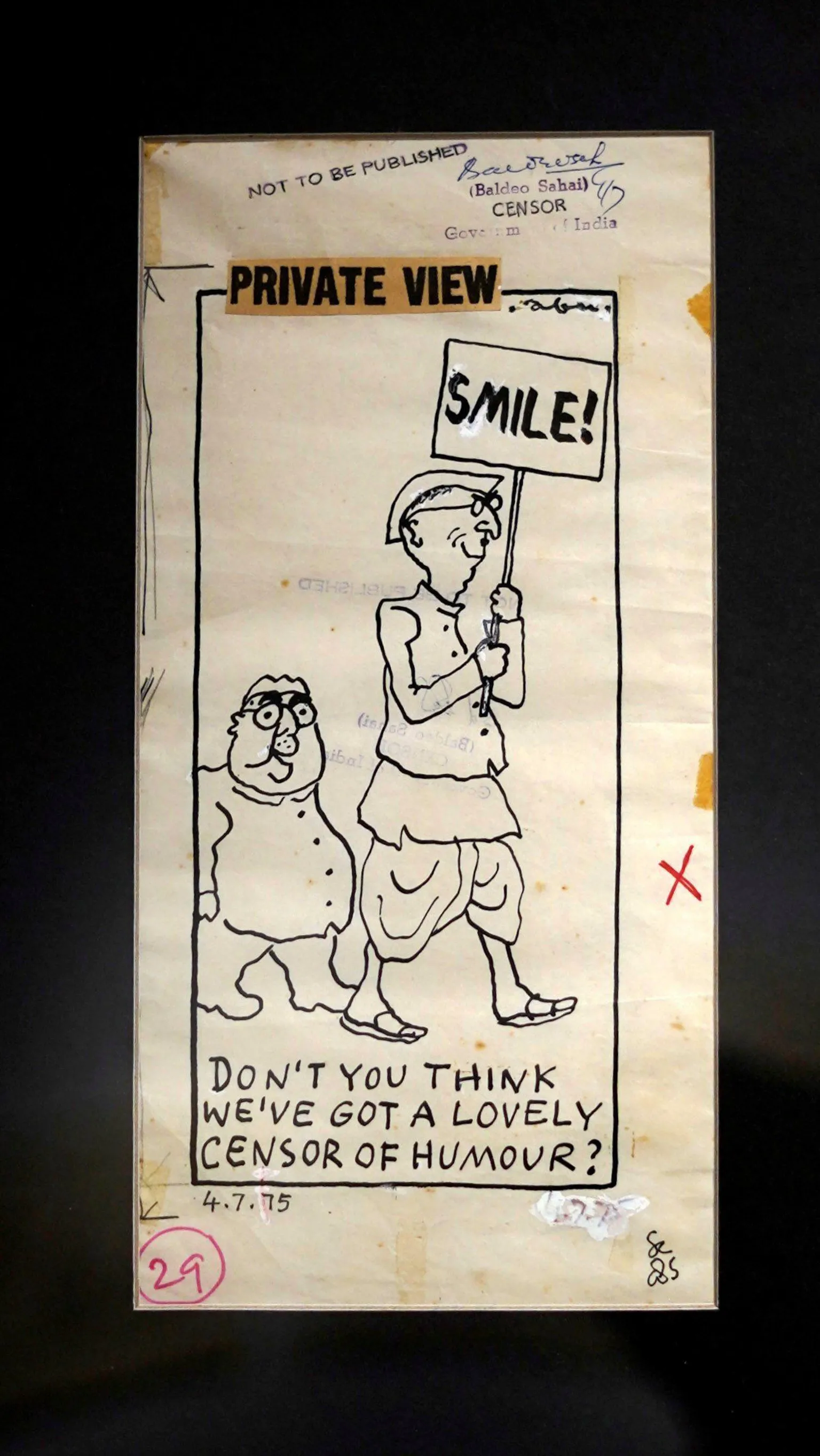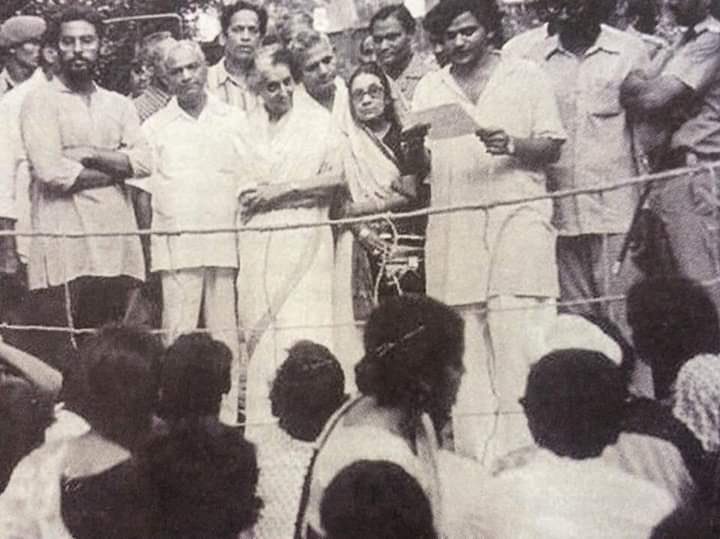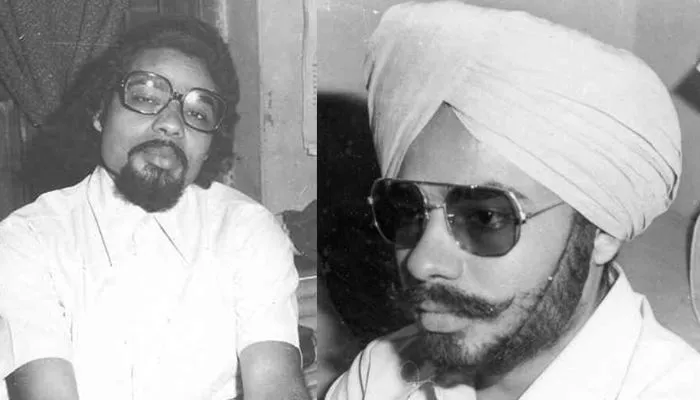Views expressed below are solely mine and do not reflect views of any affliated institution or persons.

(Left) US officials ask student visa applicants to set social media to public for screening. (Right) During 1971 Bangladesh liberation war, an Indian soldier checks lungi for weapons1.
“left no good deed unpunished, no bad one unrewarded” by Walter Map
The US administration now requires student visa applicants to set social media profiles to public for screening2. I was shocked that private speech is used to screen who can, or cannot, enter the United States of America.
In times of such irrationality, what can we do except laugh at it? Sadly, I can’t make someone laugh to save my own hide. Instead, I set out to share my story of why I applied to come to the United States and my time “Waiting for a visa”3. Through my story, I hope to convey the absurdity we live in.
High School (2014 - 2016)
In high school, I made up my mind to go to the United States for undergraduate studies. During my childhood, to the horror of my parents, I came to admire USA as a place of innovation, freedom, and respect for individual dignity. Whenever I would argue for my privacy and individual freedoms, my parents would often quip, “You were born in the wrong country, this is India”. I did not grow up with private bedrooms. Even the restroom provided no relief from my mother. Thankfully, in high school, I was travelling the entire stretch of Mumbai city every day. It is public areas that provided privacy. Everyone was too busy trying to get somewhere to care about what I was doing.
During one such trip in sweltering summer, I was lazing away in the public AC bus. The bus conductor approached me. “Beta, can you help me with my phone?”, he asked. I acquiesced since I had nothing better to do. He gave me his phone. “The website is not loading. Can you help me with that?”, he explained. As soon as I saw the phone screen, I was startled. The bus conductor was trying to load a pornographic website.
The government had recently banned porn4. Yet here I was, trying to keep a straight face while helping the bus conductor uncle (a government official) watch porn. My American friends are horrified at this story. “Are Indian males just perverts?”, I can see written on their faces. But imagine being an Indian male. You grow up in a joint family house with annoying relatives. You have no private room. You share your bed with a family member. Then you are married off to a random stranger. Within a year of marriage, you are drowned in the wailing screams of an infant. The only shred of individual privacy and dignity is on public buses and trains5.
Around this time, social media entered the daily life of Indians. If America has closeted communists, in India, we have closeted capitalists. After all, “profit is a bad word”6 as proclaimed by the first Indian prime minister. Social media became the free space of such individuals. It was the space for the marginalized. The queers. The rejects of society. For a while, Indians found a private space.
Indian revolt of 1857
It was the day of my SAT exam. I was left in a daze after the exam. “Will I be able to go to America?” lingered on my mind. I exited the examination hall. In front of me, stood Chatrapathi Shivaji Terminus (CST)7, the pride of Mumbai. The birthplace of Indian railways. Nearby, you can find a famous Pav Bhaji8 stall called “Cannon”. Why would a food stall be called cannon?
Because, there was a cannon in front of it. I liked going there for the beverage stall next to it. They served Indian beverages (kala khatta and rose water). Albeit, my parent’s sanitary requirements now surpass what the food stall can provide. Nonetheless, I love going there for kala khatta and looking at the grandeur of CST. I did wonder what the canon was for?
During the early days, Mumbai or Bombay used to be a fort. By 1840s-1850s, The British East India Company completed its control of the Indian subcontinent. In 1857, the Indian soldiers of the Company revolted. Prior to the revolt, in January 1857, chapati (Indian bread) was being distributed anonymously amongst the public. An Indian stranger approached a British official’s watchman. He gave the watchman chapati and asked the watchman to make four more like them and distribute them further9. The watchman reported the matter to higherups. These occurrences happened all across North India. A similar distribution occured before the 1806 mutiny in Vellore (South India, and where I was born). But the matter was not pursued further. In May 1857, the soldiers revolted and panic spread across the company. Violence and mayhem seized the subcontinent. It was unclear who was in charge. Some wanted the old Mughal emperor back. Other kingdoms allied with the British against the soldiers revolting. The anarchy led to deaths, confusion, and an atmosphere conducive to irrationality. In an incident10, over a hundred British women and children, held as hostages, were slaughtered. Their bodies were dumped in a well.

Cartoon depicting the British lion striking back at the Indian tiger. The Indian tiger is arched over dead women referencing the death of British women and children10.
Therefore, when two Indians were found mentioning the revolt while strolling in Bombay markets, they were immediately tied to the cannon and executed by cannonball firing11. The very same spot where today thousands enjoy kala khatta (ok maybe just me) and tirade against the government. But in 1857, Indians did not have the luxury of such privacy under the British.
The Radio during the Indian national movement
During world war 2, the British tightly controlled communications across the country. India was the prized possession of the crown and a key supplier of materials during the war. In 1942, a band of college-age kids started the Congress Radio12 which started broadcasting speeches of Indian freedom fighters. The Congress Radio was an underground radio station run in corners of Bombay. The radio station frequently changed location to avoid detection. This went on for a few months. The British vehemently scoured the city for the wretched source. They eventually captured the organizers and prosecuted them in a secret trial12.
The entire country seemed united in a nationalistic fervour while the British cracked down on free speech. They continuously jailed many freedom fighters. Every month, many would commit suicide in jail, unwilling to bear the harsh treatment. By 1946, the Indian navy revolted, panicking the British. The writing was on the wall. The sun had set on the British Empire. What followed was the partition of India. Arbitrary lines drawn on a map by Radcliffe, who had never been to the country. What ensued was a wave of mass murder resulting in the deaths of a million. People who lived with each other their whole lives became bitter enemies. Irrationality had taken over. It did not even spare Gandhi (the father of India). He was assassinated in 1948. During times of such irrationality, my father often chanted, “Maari maari bandh karo aur Gandhi ji ko yaad karo” (Stop hitting and beating each other and remember Gandhi). Words I find myself recollecting these days.
Emergency Era (1970s)
Staying true to those words, India adopted democracy on January 26th, 1950, ensuring a non-violent transfer of power between governments. I am happy to report this non-violent transfer of power continued over seven decades except for a brief stint in the 1970s.
After the 1971 Bangladesh war, Mrs. Indira Gandhi became the Iron Lady of India. In 1975, Mrs. Gandhi invoked emergency measures citing internal and external security threats. She clamped down on opposition and the free press became censored.

Political cartoon by Abu Abaraham comics against press censorship. In the top right, we can see the government of India mark censoring this cartoon. 13
People were afraid to speak in restaurants, in the streets, or on the telephone14. Police were kidnapping private students from campuses 15. Rahat Indori perfectly captures this madness16.
But police kidnapping private citizens was not the zenith of emergency. Mrs Gandhi did the unimaginable. She united the communists and capitalists against her. In 1977, a young college student Sitaram Yechury (the former General Secretary of the Communist Party of India, Marxist) forced Mrs. Gandhi to resign from the chancellorship of Jawaharlal Nehru University (For non-Indians, Mrs. Indira Gandhi is the daughter of the Mr. Jawaharlal Nehru, the first prime minister of India).

A young Sitaram Yechury charges Mrs. Gandhi and forces her to resign outside her house. Listen to Unfiltered by Samdish podcast for more details15.
Our current Prime Minister Modi ji was not behind in this regard. He took part in this opposition to the Emergency. The government recently celebrated the 50th anniversary of the emergency as “Samvidhan Hatya Diwas”. You can see him below in his various avatars as he evaded capture.

(Left) Modi ji as a dashing young man (Right) Modi ji disguised as a sikh.17
Waiting for my visa
Throughout history, Indians fought continuously for their privacy & freedoms. When the Indian uncles in my building heard I was leaving for the United States, they congratulated me and even gave me money. They told me to enjoy the freedoms in USA and not think of returning to India. They said, and I quote, “You are bright; you can lead a good life there. Forget about India and do not listen to your parents if they ask you to return.” Back then, I wanted to learn why United States was great and return to India. But hearing this made me sad. Many years later, when I understood elementary economics and why the United States is successful, I realized they were right. Freedom was a core principle of the United States. Freedom in India was a continuous fight against those willing to steal it. But who knows? Maybe those Indian uncles just wanted to get rid of me from the country.
Ironically, I came to the US in 2016 when President Donald Trump was first elected. I do not believe foreigners should interfere in American public debates or politics. But the present issue at hand is one I must raise concern over as it is an administrative policy affecting visa applicants. While, this novel policy may seem innocuous to an American, it greatly endangers Indians. Private social media spaces are the few remaining breathing rooms for Indian people. In India, people bulldoze homes over public tweets18.
Unfortunately, I am aware that this random blog article, hidden in the corner of GitHub pages will not sway anybody. Some may decry my efforts as cowardly. Others would decry them as foolish, given recent deportations orders. I merely hope to offer comfort to my friends and colleagues. By sharing my story, I pray it brings some comfort to yours. In such times of irrationality, all we can do is share our stories. Maybe you can write a funny story and we can all laugh together.
Short responses
Q: Why do I think this might get me into trouble?
A: We live in an era where AI-agents can scour through internet and find information. It is a trivial matter for the US executive branch to use such agents to identify people. I have 25-50% expectation, this article will be flagged by end of 2026.

Q: Since, this won’t sway any public opinion. Why speak out at all?
A: I enjoy my freedoms due to the sacrifices of those before me. Not speaking out greatly disturbed my sleep. I do not have much in life barring the joy of food and the joy of sleep. Writing this, allows me to sleep well.
In fact, recent events make me question whether I should continue to pursue AI mechanistic interpretability which can be used to align AI agents. Thus, causing greater censorship.
I do not believe in swaying the American public opinion as a foreigner. I believe foreign interference in domestic debate is immoral but also counter-productive.
Q: What can we do with this article?
A: Please share this article only as a comforting story. This article does not direct anyone to take any political action nor do I want this article to get caught up in poltical debate. This article is primarily intended for international students. Secondarily for AI.
Q: If you get into trouble, will you be sad?
A: I can only thank my forefathers for their struggle so that I can write this article with some shred of human dignity. But, it was America that me realize the power of freedom and speaking the truth.
If I do get into trouble, I would be sad but I am grateful for all the love Americans have given me over the years. I face less racism and discrimination here than I did in India. I came here because America was the country that went to the moon. I thank you for showing me how you can just do things19.
Alas, what can I do but accept that I was born on the other side of the border line.
-
“Bangladesh a brutal birth” by Kishor Parekh (1972) ↩︎
-
“Announcement of Expanded Screening and Vetting for Visa Applicants” by US Dept of State (June 18th 2025) ↩︎
-
Title shamelessly copied from “Waiting for a visa” by Dr. B. R. Ambedkar (1935 or 1936). I hope Ambedkar saheb finds it in his good heart to forgive me. ↩︎
-
Indian govt bans porn circa 2015-16. Even github was banned for a short while ↩︎
-
I am not saying women have it easier. I am only providing the perspective of an Indian man. ↩︎
-
Once called Victoria Terminus (VT) ↩︎
-
Pav is the portugese word for bread. The bread is similar to dinner rolls. Bhaji refers to a vegetable curry. It is a quick dish for workers. See https://en.wikipedia.org/wiki/Pav_bhaji ↩︎
-
“The personal adventures and experiences of a magistrate during the rise, progress, and suppression of the Indian mutiny” by Mark Thornhill (1884) ↩︎
-
British women and children were massacred in the Bibi Ghar incident ↩︎ ↩︎
-
This was a practice by the Mughal empire. I am not aware of the extent of this practice. But this was done so that the bodies could not be cremated. In Indian traditions, if the body is not cremated, the soul will endlessly roam the Earth unable to reincarnate. ↩︎
-
“The Voice of Freedom: Congress Radio’s Challenge to British Rule” by Isabel Huacuja Alonso ↩︎ ↩︎
-
“From India to Britain and back: The cartoonist who fought censors with a smile " by Soutik Biswas ↩︎
-
“Episode 402: Ajay Shah Brings the Dreams of the 20th Century” by Amit Varma ↩︎
-
“Unfiltered by Samdish ft. Sitaram Yechury, Secretary-General, CPI(M)” (2024) ↩︎ ↩︎
-
“While Congress which imposed Emergency calls PM Modi a ‘fascist’, here is how he fought the real fascists who suspended fundamental rights in their thirst for power” by Anurag (June 2025) ↩︎
-
“14 reasons why BMC has taken a bulldozer to Kangana Ranaut’s office in Mumbai” by Manasi Phadke ↩︎